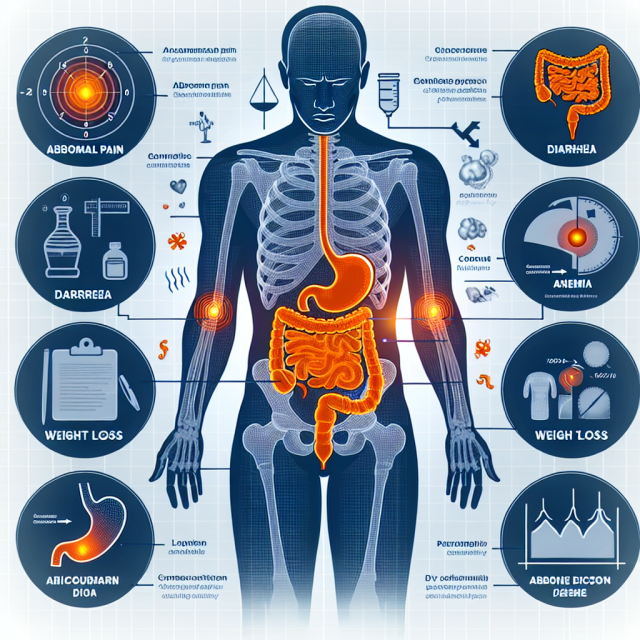
Living with a chronic illness like Crohn’s disease can feel like navigating an unpredictable storm. Symptoms can come and go, often without warning, making it essential to know what to watch for. Whether you’re a patient or a caregiver, understanding Crohn’s disease symptoms can empower you to take action and improve quality of life.
Table of Contents
1. What Is Crohn’s Disease?
Crohn’s disease is a type of inflammatory bowel disease (IBD) that can affect any part of the gastrointestinal tract, from the mouth to the anus. It’s a lifelong condition, and recognizing Crohn’s disease symptoms early can significantly impact how well it’s managed.
Analogy: Think of your digestive system as a well-oiled machine. When one part isn’t functioning right, it disrupts the entire process.
2. Why Recognizing Symptoms Matters
Catching symptoms early can prevent complications and improve treatment outcomes. It can also give patients and caregivers peace of mind. The earlier you understand what’s happening, the sooner you can act.
Important Note: Symptoms can range from mild to severe, and they don’t always appear in the same way for everyone.
3. Common Digestive Symptoms
Digestive symptoms are often the first signs of Crohn’s disease, and they can be disruptive. Let’s break down the most common ones so you know what to watch for.
4. Persistent Diarrhea
Chronic diarrhea is one of the hallmark symptoms. It can be frequent and urgent, making daily life unpredictable and stressful.
Advice for Caregivers: If you’re caring for someone with Crohn’s, be prepared to adjust plans and offer support during flare-ups.
5. Abdominal Pain and Cramping
Imagine feeling like you’re constantly dealing with food poisoning. That’s how abdominal pain can feel for someone with Crohn’s. The pain is usually due to inflammation and ulceration in the digestive tract.
Tip: Keeping a pain diary can help doctors understand the frequency and severity of symptoms.
6. Bloody Stools
Seeing blood in your stool can be alarming, and it’s not something to ignore. Bloody stools may indicate significant inflammation or ulcers in the digestive tract.
Action Step: Contact your doctor immediately if this symptom occurs. Early intervention is crucial.
7. Non-Digestive Symptoms
Crohn’s disease isn’t limited to the digestive system. It can affect other parts of the body, causing a wide range of additional symptoms.
Reminder: Non-digestive symptoms can be just as disruptive as digestive ones.
8. Fatigue and Weakness
Inflammation and malnutrition often lead to severe fatigue. It’s not the kind of tiredness you shake off with a nap—it’s more profound and persistent.
Advice for Patients: Listen to your body. Rest when needed and prioritize activities that conserve energy.
9. Weight Loss and Malnutrition
Malnutrition is common because inflammation can prevent the body from absorbing nutrients properly. This can lead to unintentional weight loss and other health complications.
What to Do: Work with a nutritionist to ensure you’re getting essential nutrients, even during flare-ups. Visit HealingWell for more dietary guidance.
10. Skin, Joint, and Eye Issues
Did you know that Crohn’s can cause problems outside of your digestive system? Joint pain, eye inflammation, and skin rashes are just a few examples. These symptoms are often a sign that the immune system is in overdrive.
Interesting Fact: Nearly half of people with Crohn’s experience non-digestive symptoms at some point.
11. When to Seek Medical Help
So, when should you consult a healthcare provider? If you experience persistent symptoms like severe pain, bloody stools, or rapid weight loss, don’t wait.
Key Reminder: Always err on the side of caution. Even if symptoms seem mild, they can escalate quickly.
For more support and real-life experiences from others with Crohn’s, join the HealingWell Community.
Conclusion
Understanding and recognizing Crohn’s disease symptoms can be life-changing. The sooner you or a loved one can pinpoint the signs, the faster you can seek treatment and take control of the condition. Remember, you’re not alone in this journey. Stay informed, stay proactive, and lean on your support network.
FAQs
1. What is the first sign of Crohn’s disease?
Persistent diarrhea and abdominal pain are often the first symptoms. However, it can vary from person to person.
2. Can Crohn’s disease symptoms come and go?
Yes, Crohn’s disease often goes through periods of flare-ups and remission, making symptom management challenging.
3. Are there effective treatments for Crohn’s disease?
While there is no cure, treatments like Remicade and Humira can help manage symptoms and improve quality of life.
4. How does Crohn’s disease affect daily life?
It can impact everything from diet to energy levels and even emotional well-being. Planning and support are crucial.
5. Can stress make Crohn’s disease symptoms worse?
Yes, stress can exacerbate symptoms. Techniques like meditation and therapy can be beneficial.
For further information on Crohn’s disease and living with a chronic illness, visit HealingWell.





